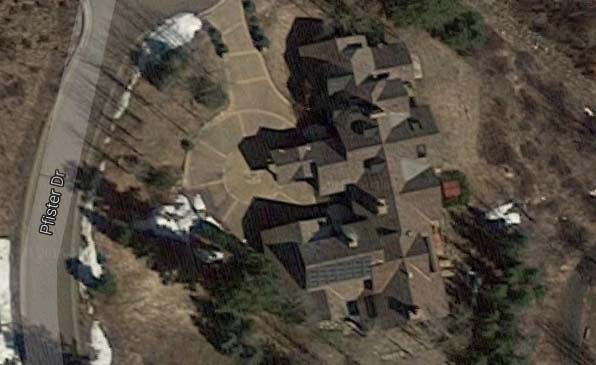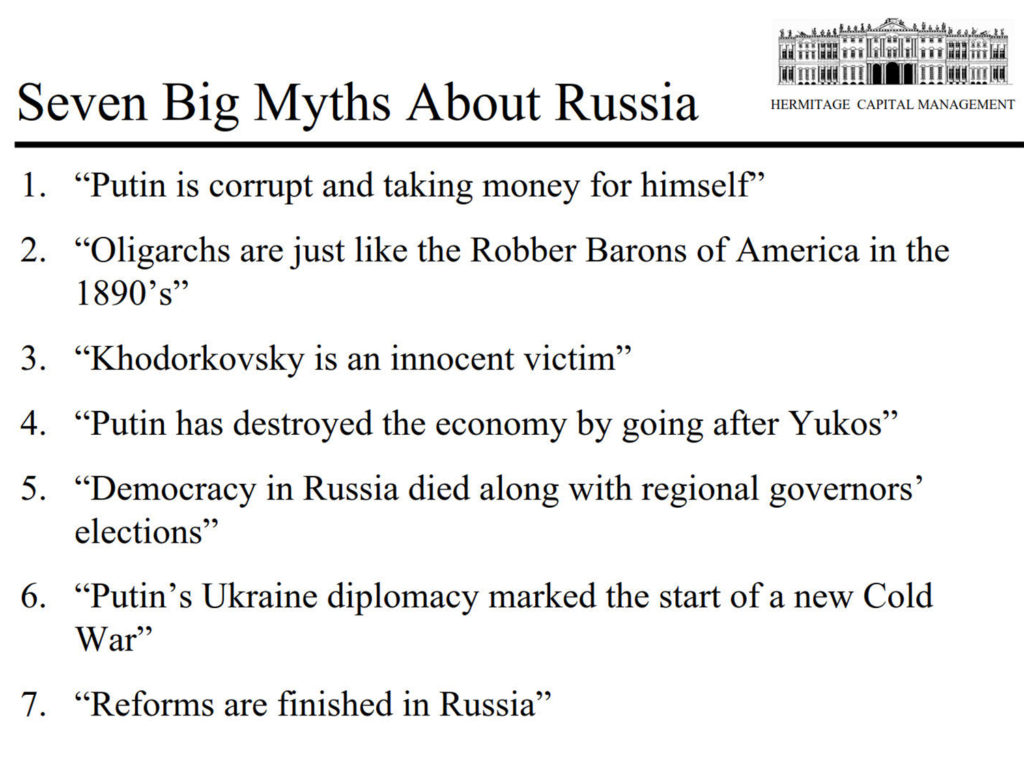By Lucy Komisar
Jan 11, 2018 –
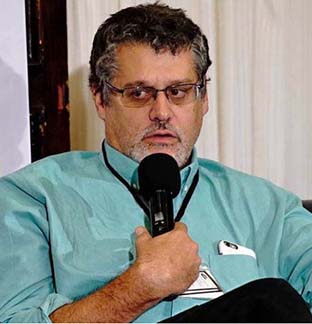
The most interesting new assertion in Glenn Simpson’s testimony before the Senate Judiciary Committee August 22, 2017, just released by Sen. Diane Feinstein, is this: that charges promoted by William Browder and adopted by the Justice Department to target the Russian real estate company Prevezon originated with a Russian organized crime figure, Demetri Baranovsky.
He is associated with Russia’s biggest organized crime family, the Solntsevo Brotherhood, which had allegedly been extorting Prevezon, which had reported this to the police.
Baranovsky had been jailed for running a shake-down operation in which he posed as an anti-corruption campaigner for the purpose of extorting money from people by threatening to accuse them of corrupt activities.
For the rest, Simpson echoes what has been written here about Browder’s use of offshore shell companies to hide his operations, his Russian tax evasion, and his attempts to evade court subpoenas to testify in the case that he created. In some cases I’ve linked to documents that prove the accuracy of Simpson’s statements.
Simpson is a former Wall Street Journal investigative reporter hired by the Washington-New York law firm BakerHostetler to delve into the shadowy operations of William Browder, the American-born British investor who was behind the Justice Department attack on its client Prevezon, a real estate holding company owned by a Russian, Denis Katsyv. Browder had gotten the DOJ to go after Prevezon to create a story to block Russian authorities from going after him for some $70 million in evaded taxes and illicit stock buys.
See Browder lie to the Senate Judiciary Committee in July 2017. Video.
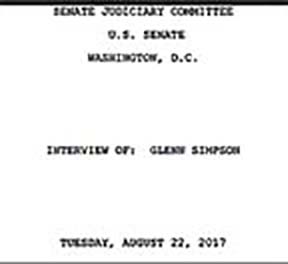
Here are the parts of Simpson‘s 315-page testimony that deal with Browder.
The full transcript is here.
21 A [Simpson]. We were retained by Baker Hostetler in the
22 spring of 2014 to do litigation support, and under
23 the heading of litigation support was things
24 related to discovery, locating witnesses, answer
25 questions from the press, gathering documents,
Page 36
when
16 you’re a subcontractor to a law firm, you know,
17 you’re sort of in a lane and, you know, my lane was
18 research, discovery, William Browder’s business
19 practices, his activities in Russia, his history of
20 avoiding taxes.
Page 38
— the client’s explanation for or
13 response to the government’s allegations was that
14 they originated with an organized crime figure in
15 Russia who had been extorting them and who they had
16 reported to the police and who had been jailed and
17 convicted for blackmailing them, and they claimed
18 that that was where these allegations originated,
19 which, you know, seemed remarkable because it was
20 in a Justice Department complaint.
Page 39
So originally one of the first things we were
7 hired to do was to check out whether this was, in
8 fact, the case. So they claimed that the
9 allegations originated with a mobster named Demetri
10 Baranovsky, B-A-R-A-N-O-V-S-K-Y, who was, in fact,
11 jailed for running a shake-down operation in which
12 he posed as an anti-corruption campaigner for the
13 purpose of extorting money from people by
14 threatening to accuse them of some kind of corrupt
15 activities. As you know, Russia is rife with
16 corruption and there’s a lot of anger over
17 corruption.
18 We were able to ascertain that Mr. Baranovsky
19 was, in fact, associated with Russia’s biggest
20 organized crime family, the Solntsevo Brotherhood,
21 S-O-L-N-T-S-E- V-O brotherhood, which is the major
22 dominant mafia clan in Moscow. So as far as it
23 went, the client seemed to be telling the truth.
24 You know, there was extensive record of these
25 events and we found some indications from western
Page 40
1 law enforcement that western law enforcement did
2 consider Baranovsky to be a lieutenant in this
3 organized crime family.
8 And, you know, around the — similarly, there
9 was a deposition of a customs agent by one of the
10 lawyers who — you know, in this initial effort to
11 trace the origin of these allegations, where they
12 came from, how they could have ended up with the
13 Justice Department, the first thing we did was
14 interview the client, got their story, and
15 interviewed the agent who worked on the case for
16 the DOJ and that agent said he got all his
17 information from William Browder.
18 So at that point I was asked to help see if
19 we could get an interview with William Browder.
20 They wrote a letter to Browder and asked him to
21 answer questions and he refused. Then the lawyers
22 wanted to know, you know, whether he could be
23 subpoenaed. So a lot of what I did in 2014 was
24 help them figure out whether he could be subpoenaed
25 in the United States to give a deposition, and the
Page 41
1 first thing that we did was we researched the
2 ownership and registration of his hedge fund, which
3 was registered in Delaware and filed documents with
4 the Securities and Exchange Commission.
5 So we subpoenaed his hedge fund. A lot of
6 the early work I did was just documenting that his
7 hedge fund had presence in the United States. So
8 we subpoenaed his hedge fund. He then changed the
9 hedge fund registration, took his name off, said it
10 was on there by accident, it was a mistake, and
11 said that he had no presence in the United States
12 and that, you know — as you may know, he
13 surrendered his citizenship in 1998 and moved
14 outside the United States. That was around the
15 time he started making all the money in Russia. So
16 he’s never had to pay U.S. taxes on his profits
17 from his time in Russia, which became important in
18 the case later.
19 In any case, he said he never came to the
20 United States, didn’t own any property here, didn’t
21 do any business here, and therefore he was not
22 required to participate in the U.S. court system
23 even though he admitted that he brought the case to
24 the U.S. Justice Department. So we found this to
25 be a frustrating and somewhat curious situation.
Page 42
1 He was willing to, you know, hand stuff off to the
2 DOJ anonymously in the beginning and cause them to
3 launch a court case against somebody, but he wasn’t
4 interesting in speaking under oath about, you know,
5 why he did that, his own activities in Russia.
Browder’s Aspen estate at 691 Pfister Drive.
6 So looking at the public record we determined
7 that he did come to the United States frequently,
8 and I discovered through public records that he
9 seemed to own a house in Aspen, Colorado, a very
10 expensive mansion, over $10 million, which he had
11 registered in the name of a shell company in a
12 clear attempt to disguise the ownership of the
13 property. We were able to ascertain that he does
14 use that property because he registered cars to
15 that property with the Colorado DMV in the name of
16 William Browder.
17 So we began looking for public information
18 about when he might be in Aspen, Colorado, and I
19 found a listing on the Aspen Institute Website
20 about an appearance he was going to make there in
21 the summer of 2014. So we — I served him a
22 subpoena in the parking lot of the Aspen Institute
23 in the summer of 2014 using two people — two
24 subcontractors. Actually, those other
25 subcontractors were — their names escape me, but I
Page 43
1 forgot about those. We can get you that. This is
2 all in the Pacer court record, the public court
3 record.
4 In any event, the three of us served — there
5 was another subcontractor working for the law firm
6 whose name I also forget. I did not retain him,
7 but I was asked to work with him on this. He is a
8 private investigator and we can get you his name.
9 In any event, we served him the subpoena and he ran
10 away. He dropped it on the ground and he ran away.
11 He jumped in his car and went back to his mansion.
12 At that point he tried to suppress — tried
13 to quash the subpoena on the grounds it hadn’t been
14 properly served. We didn’t get a video, but there
15 are sworn affidavits from my servers in the court
16 record about the service. But he objected to it on
17 a number of grounds.
A, he continued to insist he
18 had nothing to do with the United States and didn’t
19 come here very often even, though we caught him
20 here, clearly has cars in Colorado. He also said
21 that you can’t serve a subpoena for a case in
22 New York in the state of Colorado, it’s outside the
23 primary jurisdiction. He also began to raise
24 questions about whether Baker Hostetler had a
25 conflict of interest because of some previous work
Page 44
1 he did with one of the Baker lawyers.
2 This led to a long, drawn-out discovery
3 battle that I was in the center of because I served
4 the subpoenas and I helped find the information for
5 the first set of subpoenas that lasted, you know,
6 through 2014. This was, you know, a lot of what I
7 did. This was — the main focus was on trying to
8 get William Browder to testify under oath about his
9 role in this case and his activities in Russia.
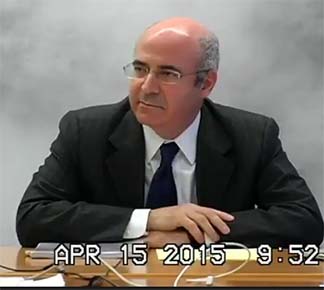
10 All of this — his determined effort to avoid
11 testifying under oath, including running away from
12 subpoenas and changing — frequently changing
13 lawyers and making lurid allegations against us,
14 including that, you know, he thought we were KGB
15 assassins in the parking lot of Aspen, Colorado
16 when we served the subpoena, all raised questions
17 in my mind about why he was so determined to not
18 have to answer questions under oath about things
19 that happened in Russia.
20 I’ll add that, you know, I’ve done a lot of
21 Russia reporting over the years. I originally met
22 William Browder back when I was a journalist at the
23 Wall Street Journal when I was doing stories about
24 corruption in Russia. I think the first time I met
25 him he lectured me about — I was working on a
Page 45
1 story about Vladimir Putin corruption and he
2 lectured me about how have Vladimir Putin was not
3 corrupt and how he was the best thing that ever
4 happened to Russia. There are numerous documents
5 that he published himself, interviews he gave
6 singing the praises of Vladimir Putin. At that
7 time I was already investigating corruption in
8 Putin’s Russia.
Browder/Hermitage wrote and distributed this chart attacking the terrible lies people were saying about Putin.
9 So this made me more curious about the
10 history of his activities in Russia and what that
11 might tell me about corruption in Russia, and as
12 part of the case we became curious about whether
13 there was something that he was hiding about his
14 activities in Russia. So through this period while
15 we were attempting to get him under oath we were
16 also investigating his business practices in Russia
17 and that research — and I should add when I say
18 we, I mean the lawyers were doing a lot of this
19 work and it wasn’t — I can’t take responsibility
20 or pride of place on having done all this work. We
21 were doing it all together. It was a — you know,
22 there were a number of lawyers involved, other
23 people.
24 In the course of doing this research into
25 what he might not want to be asked about from his
Page 46
1 history in Russia we began to learn about the
2 history of his tax avoidance in Russia and we began
3 to deconstruct the way that his hedge fund
4 structured its investments in Russia and, you know,
5 we gradually accumulated through public records,
6 not all from Russia, that he set up dozens of shell
7 companies in Cyprus and other tax havens around the
8 world to funnel money into Russia and to hold
9 Russian securities.
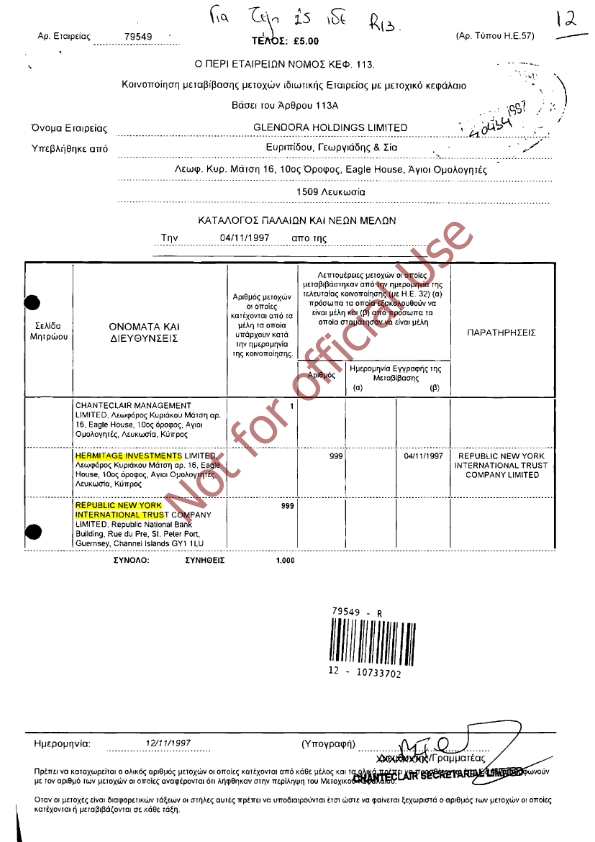
10 He also set up shell companies inside of
11 Russia in order to avoid paying taxes in Russia and
12 he set up shell companies in a remote republic
13 called Kalmykia, K-A-L-M-Y-K-I-A, which is next to
14 Mongolia. It’s the only Buddhist republic in
15 Russia and there’s nothing much there, but if you
16 put your companies there you can lower your taxes.
17 They were putting their companies in Kalmykia that
18 were holding investments from western investors and
19 they were staffing these companies — they were
20 using Afghan war veterans because there’s a tax
21 preference for Afghan war veterans, and what we
22 learned is that they got in trouble for this
23 eventually because one of Putin’s primary rules for
24 business was you can do a lot of things, but you’ve
25 got to pay your taxes.
Page 47
1 In fact, William Browder famously said in
2 2005 at Davos everybody knows under Putin you have
3 to pay your taxes, which is ironic because at the
4 time he was being investigated for not paying
5 taxes. Ultimately they were caught, some of these
6 companies were prosecuted, and he was forced to
7 make an enormous tax payment to the government of
8 Russia in 2006.
9 I will add that Sergei Magnitsky was working
10 for him at this time and all of this happened prior
11 to the events that you are interested in involving
12 the Russian treasury fraud and his jailing. This
13 precedes all that.
14 But returning to the detailed discussion of
15 my work, we investigated William Browder’s business
16 practices in Russia, we began to understand maybe
17 what it was he didn’t want to talk about, and as we
18 looked at that we then began to look at his
19 decision to surrender his American citizenship in
20 1998. At that point somewhere in there the Panama
21 papers came out and we discovered that he had
22 incorporated shell companies offshore in the mid
23 1990s, in 1995 I believe it was in the British
24 Virgin Islands, and that at some point his hedge
25 fund’s shares had been transferred to this offshore
Page 48
1 company.
2 This offshore company was managed — several
3 of his offshore companies were managed by the
4 Panamanian law firm called Mossack Fonseca,
5 M-O-S-S-A-C-K, Fonseca, F-O-N-S-E-C-A, which is
6 known now for setting up offshore companies for
7 drug kingpins, narcos, kleptos, you name it. They
8 were servicing every bad guy around. And I’m
9 familiar with them from other money laundering and
10 corruption and tax evasion investigations that I’ve
11 done.
12 I’ll note parenthetically that William
13 Browder talks a lot about the Panama papers and the
14 Russians who are in the Panama papers without ever
15 mentioning that he’s in the Panama papers. This
16 is, again, a public fact that you can check
17 on-line.
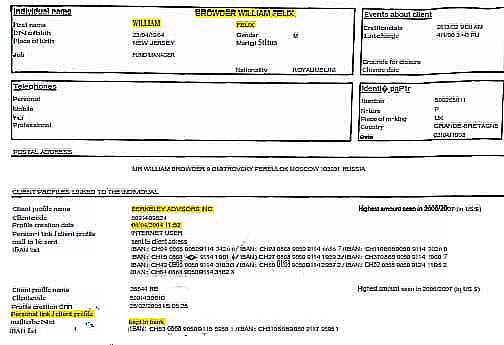
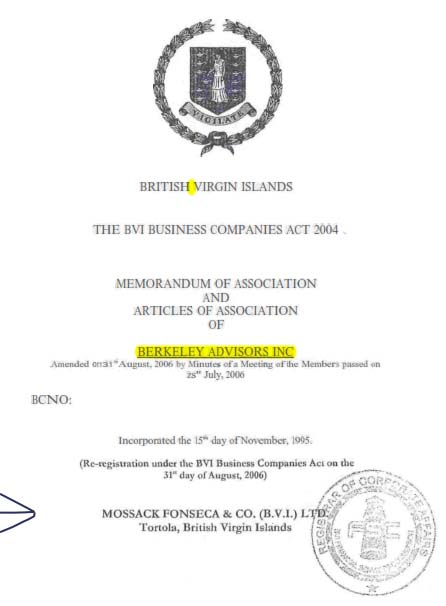
18 So that’s an overview of the sort of work I
19 was doing on this case. In the course of that I
20 also began reaching back, I read his book Red
21 Notice to understand his story and the story of his
22 activities in Russia. I’ll add also that I was
23 extremely sympathetic for what happened to Sergei
24 Magnitsky and I told him that myself and I tried to
25 help him. It was only later from this other case
Page 50
1 A. I’ll just finish with one last thing and
2 I’m happy to answer that question.
3 So in the course of this, you know — I mean,
4 one of my interests or even obsessions over the
5 last decade has been corruption in Russia and
6 Russian kleptocracy and the police state that was
7 there. I was stationed in Europe from 2005 to 2007
8 or ‘8. So I was there when Putin was consolidating
9 power and all this wave of power was coming. So
10 it’s been a subject that I’ve read very widely on
11 and I’m very interested in the history of Putin’s
12 rise.
13 You know, in the course of all this I’ll tell
14 you I became personally interested in where Bill
15 Browder came from, how he made so much money under
16 Vladimir Putin without getting involved in anything
17 illicit. So I read his book and I began doing
18 other research and I found filings at the SEC
19 linking him quite directly and his company, Salomon
20 Brothers at the time, to a company in Russia called
21 Peter Star, and I had, as it happens, vetted Peter
22 Star and I knew that Peter Star was, you know, at
23 the center of a corruption case that I covered as a
24 reporter at the Wall Street Journal. When I went
25 back into the history of Peter Star I realized that
Page 51
1 Bill Browder did business with the mayor’s office
2 in Saint Petersburg when Vladimir Putin was the
3 deputy mayor and was responsible for dealing with
4 western businessmen and corporations.
5 I then went and looked in Red Notice, this
6 was a large deal, it was the biggest deal ever for
7 Salomon at that time, they sold $98 million worth
8 of stock on NASDAQ. There’s no mention of William
9 Browder’s deal with Peter Star in Red Notice. I
10 can’t tell you why, but I can tell you that Peter
11 Star later became the subject of a massive
12 corruption investigation, Pan-European, that I
13 exposed a lot of and that led to the resignation of
14 Putin’s telecoms minister. So I assume he might
15 not have — this is kind of a pattern with Browder,
16 which is he tends to omit things that aren’t
17 helpful to him, and I think we’ve seen a good bit
18 of that lately in his allegations against me, which
19 I’m sure you’re going to ask me about.
20 So your question about the ICE agent, he was
21 deposed by John Moscow of the New York office of
22 Baker Hostetler. John is an old associate of mine
23 from my days as a journalist. John’s an expert on
24 tax evasion and money laundering. He was the head
25 of the rackets bureau for the district attorney’s
Page 95
19 EXAMINATION
20 BY MR. DAVIS:
21 Q. All right. Mr. Simpson, I’m going to
22 return to the topic of Prevezon. Let me know if
23 I’m accurately summarizing the scope of work you’re
24 describing. I think you’ve described three main
25 areas so far. First is that you were investigating
Page 96
1 Prevezon’s side of the story to see if it was
2 credible; the second is you were investigating Bill
3 Browder’s ties to the U.S. and related subpoena
4 issues; and the third is that you were
5 investigating Bill Browder’s Russian businesses.
6 Is that correct?
14 A. Is that a yes-or-no question? I think
15 those are three things I covered, but I covered a
16 lot of stuff.
17 Q. With the information that you gathered in
18 those and related efforts, what did you do with the
19 information once you obtained it?
20 A. Well, the first thing you do is you give
21 it to the lawyers and, you know, when appropriate
22 you give it to reporters, you know, put it in court
23 filings.
24 Q. So is it correct, then, people associated
25 with Fusion did communicate with journalists about
Page 99
1
16 Q. And with which news organizations did
17 Fusion communicate in relation to the Prevezon
18 case?
19 A. I will try to remember them. It was the
20 major news organizations that were covering the
21 litigation. Usually it was their courthouse or
22 legal reporters. So it was Bloomberg, New York
23 Times, Wall Street Journal, probably Reuters, Legal
24 360. I’m sure there were a handful of others.
25 Q. Was the Financial Times possibly one of
Page 100
1 them?
2 A. Yes.
3 Q. Politico?
4 A. They approached us with — they had been
5 getting information from Bill Browder. He had
6 alleged to them that we were part of a big campaign
7 on Capitol Hill and that we were engaged in
8 lobbying and that it was all designed to affect
9 legislation or smear him or Sergei Magnitsky. So
10 eventually we did end up dealing with that, but I
11 don’t remember whether we dealt with them prior to
12 that. I don’t think they covered the case prior to
13 that.
14 Q. What about NBC?
15 A. We would have — I’m sorry. Yes.
16 Q. And the New Republic?
17 A. I think so.
18 Q. And do you recall what information you
19 provided to each or is that too into the weeds?
20 A. I don’t know if it’s in the weeds, but
21 generally speaking, the work — we provided
22 information about the work that I had done about
23 William Browder’s credibility. The whole case
24 ended up — when I said when he declined to appear
25 voluntarily as I am here and explain things, you
Page 101
1 know, it ended up being an issue of why he didn’t
2 want to talk. So a lot of it was about his
3 credibility, about his account of his activities in
4 Russia, about his history of tax avoidance, all
5 these things.
6 Q. Did Fusion provide the media information
7 alleging that Browder had illicitly engineered the
8 purchase of 133 million shares of Gazprom?
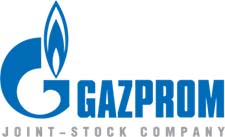
9 A. I don’t know for sure, but we certainly
10 did research on that issue.
11 Q. And you described investigating these
12 series of issues. How did you acquire the
13 information in the course of this investigate?
14 A. We used the methods that I’ve described
15 here today. We pulled court records, we pulled
16 corporate records, we, you know, pulled real estate
17 records, SEC securities filings, that sort of
18 thing.
Page 105
23 A:… I think we should note
24 here that William Browder is an especially
25 aggressive media self-promoter and promoter of his
Page 106
1 story. So for much of this case it was reactive
2 and we were constantly besieged with reporters
3 pursuing negative stories about Prevezon, the
4 events of the Prevezon case that had been given to
5 them by William Browder. So, you know, unhappily,
6 I would say, you know, a lot of what we were doing
7 was simply responding to his wild allegations,
8 unsupported wild allegations.
9 There were certainly moments, particularly
10 concerning his unwillingness to appear for a
11 deposition, where we said to some reporters, hey,
12 guy, you know, he’s just dodged his third subpoena,
13 you might want to write about this, it’s pretty
14 funny. In fact, you know, the third one he ran
15 down a street in Manhattan in the middle of a
16 blizzard to get away from our process servers, but
17 that one we actually had them film it.
18 So, you know, did we want to get that
19 covered, did we think it was important that people
20 know that this guy was unwilling to appear in court
21 in public under oath to talk about the story that
22 he’d been selling for years about his activities in
23 Russia? Yeah, we wanted people to know that.
Page 114
7 Q. Do you know Natalia Veselnitskaya?
8 She was the lawyer, the Russian lawyer who retained Baker Hostetler who retained us.
Page 115
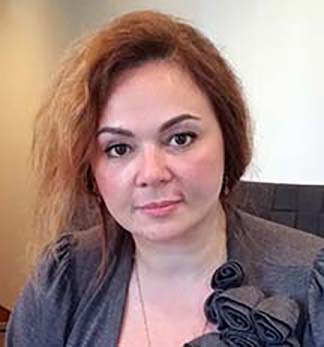
9 A. I was not introduced to her originally.
10 The original way that she was — it came up in my
11 conversations with Mark Cymrot and other Baker
12 lawyers was as the person who had hired them who
13 had the information about the extortion case
14 against Demetri Baranovsky. It was represented to
15 me by Mark Cymrot that she handled that matter and
16 was familiar with the prosecution of Demetri
17 Baranovsky and very well versed in the events of
18 the extortion.
Page 119
1 A. Beyond that my impression of her was of
2 someone who, you know, was a very smart and
3 ambitious lawyer, but not like a big political
4 player in the Kremlin. Of course given to wonder
5 given all the recent events and disclosures that I
6 was unaware of whether my assessment of her was
7 right or wrong. As we sit here today, the jury’s
8 kind of out. I honestly can tell you all I knew is
9 she didn’t seem to be a heavy hitter in the Kremlin
10 world.
Page 125
4 A. William Browder likes to use the
8 press, but he doesn’t like anyone talking freely
9 about him or raising questions about the story of
10 his activities in Russia. So when this movie came
11 together they were going to screen it in Europe and
12 he hired the meanest libel firm in London which has
13 previously sued me on behalf of Saudi billionaires
14 and — unsuccessfully I might add, and he
15 threatened to file libel cases against the people
16 who were daring to offer to host a showing of this
17 film.
18 So, as you know, they don’t have the First
19 Amendment in Europe. So he was able to
20 successfully suppress the showings of this film
21 which questioned his credibility and whether — the
22 truth of his story and his activities in Russia.
23 So Chris came up with the idea of showing it at the
24 Newseum which is dedicated to the First Amendment
25 and where they don’t have much time for libel
1 lawyers and people trying to suppress free speech.
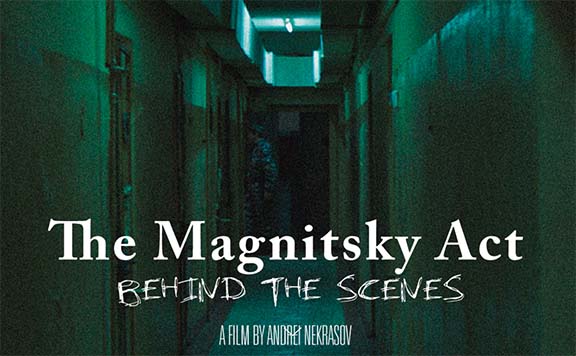
P. 130
22 Q. You mentioned you had dinner with
23 Ms. Veselnitskaya on June 8th and 10th of 2016.
24 Were you generally aware of her trip to the United
25 States in June?
P. 131
A. I was. She had trouble getting a visa and
2 the lawyers — there was some drama over whether
3 she could get a visa. This would have been a
4 recurring issue in the case. You know, our lawyers
5 believed that the Justice Department was
6 interfering with her visas because they wanted to
7 inhibit her from collaborating with us on the case,
8 but I don’t have any independent knowledge of her
9 visa issues. I just remember that was an issue.
10 I remember that at the last minute she got a
11 visa to come to this Appellate Court hearing on
12 June 9th in New York, and that was the way that she
13 persuaded them to give her a visa was that she
14 needed to attend a hearing which was on an appeal
15 of a District Court ruling related to the
16 disqualification motion that had been filed by
17 William Browder against Baker Hostetler after he
18 was ordered to give testimony.
19 So that’s the history of that court hearing,
20 which was after the Court said he couldn’t get out
21 of the subpoena and he had to give testimony, he
22 then triggered a new delay in his testimony by
23 filing a disqualification motion.
24 Q. And that hearing was on June 8th; is that
25 correct?
Page 184
16 Q. And did you understand that your actions
17 on behalf of Prevezon or Baker Hostetler would
18 principally benefit the Russian government? Who
19 did you believe the principal beneficiary to be?
20 MR. LEVY: I’d like to note for the record
21 that Patrick is smiling as he’s asking the
22 question. You can answer.
23 MR. MUSE: He’s trying to contain his
24 laughter.
Page 185
1 A. We did not believe that was being done on
2 behalf of the Russian government.
3 Q. What do you understand Prevezon’s
4 relationship, if any, to be with the Russian
5 government?
6 A. Prevezon was introduced to me as the
7 client and Denis Katsyv was the owner of Prevezon.
8 Generally speaking, when we take on a new case, you
9 know, from a respected law firm part of the, you
10 know, discussion is who’s the client, and, you
11 know, Mark Cymrot said they’ve checked out Denis
12 Katsyv and he has — he’s a legitimate businessman.
13 He’s got a real estate company, it’s a successful
14 company, and he has an explanation for how he makes
15 his money and appears to be legit. To some extent
16 whenever you enter a new case that’s part of what
17 you’re being hired to determine is whether that
18 initial due diligence stands up, but in any event,
19 he was presented to me as a successful real estate
20 investor.
Page 186
7 Q. Did you ever receive a letter of inquiry
8 from the Department of Justice regarding the
9 applicability of the Foreign Agent Registration Act
10 to your work on the Prevezon case or Magnitsky
11 matter?
12 A. No, I have not.
Page 262
1 notes about what meeting?
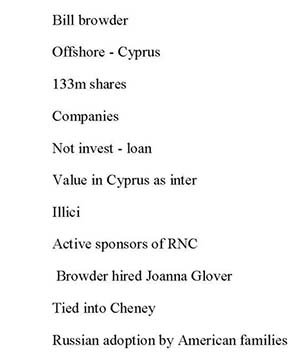
2 MR. DAVIS: These are the meeting notes from
3 the June 9th meeting at Trump Tower. These are
4 Mr. Manafort’s notes or they’re contemporaneous.
5 BY THE WITNESS:
6 A. I could tell — obviously you know who
7 Bill Browder is. Cyprus Offshore, Bill Browder’s
8 structure, you know, investment — Hermitage
9 Capital, his hedge fund, set up numerous companies
10 in Cyprus to engage in inward investment into
11 Russia, which is a common structure, both partially
12 for tax reasons but also to have entities outside
13 of Russia, you know, managing specific investments.
14 I can only tell you I assume that’s what that
15 references. I don’t know what the 133 million —
16 MR. FOSTER: Can I interrupt? And you know
17 that from research that you did and provided to —
18 MR. SIMPSON: Yes.
19 MR. LEVY: Let him finish.
20 MR. FOSTER: — research that you did and
21 provided to Baker Hostetler and their client?
22 MR. SIMPSON: Yes. There was a — I can
23 elaborate a little bit. As part of the research
24 into how Hermitage Capital worked we looked at
25 various things, their banking relationships, the
Page 263
1 way they structured their investments in Russia. I
2 don’t remember how many, but there was a large
3 number of shell companies in Cyprus that were used
4 to hold the investments of individual clients of
5 Hermitage. So one of the things we discovered from
6 that was the likely identities of some of
7 Hermitage’s clients.
19 A. I can skip down a couple. So Value in
20 Cyprus as inter, I don’t know what that means.
21 Illici, I don’t know what that means. Active
22 sponsors of RNC, I don’t know what that means.
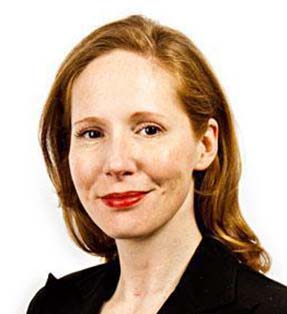
23 Browder hired Joanna Glover is a mistaken
24 reference to Juleanna Glover, who was Dick Cheney’s
25 press secretary during the Iraq war and associated
Page 264
1 with another foreign policy controversy. Russian
2 adoptions by American families I assume is a
3 reference to the adoption issue.
4 Q. And by adoption issue do you mean Russia
5 prohibiting U.S. families from adopting Russian
6 babies as a measure in response to the Magnitsky
7 act?
8 A. I assume so.
[Glover is a lobbyist with whom Browder visited a White House official to get him to add names to the Magnitsky Hit List.]
Here from Browder’s April 15, 2015 deposition in the Prevezon case, US Federal Court Southern District of New York:
6. Q. You were at The White House at the
7 beginning of 2014?
8 A. I don’t remember.
9 Q. How many times have you been to The
10 White House?
11 A. Once.
12 Q. When was that?
13 A. 2000, 2002, something like that.
14 Q. Okay. We’ll have to pull out some
15 records.
18 Q. I’m marking for identification as
19 Exhibit 17 the document entitled White House
20 Visitor Records Requests.
21 A. Yes.
22 Q. It says Name: Last, Browder?
23 A. Yes.
24 Q. Name: First, William?
25 A. Yes.
Page 304
2 Q. Middle initial F; appointment date
3 February 12, 2014; you see that?
4 A. Yes.
5 Q. So does this refresh your
6 recollection that you had a meeting at The
7 White House with a Mr. Carpenter on
8 February 12, 2014?
9 A. Could you break down the question?
10 There’s several questions there.
11 Q. Did you have a meeting at The White
12 House on February 14, 2014?
13 A. No, I had a meeting at the old
14 executive office building.
15 Q. I see. Within The White House
16 complex?
17 A. Yes.
18 Q. So when I asked you when you’d been
19 to The White House, you weren’t talking about
20 The White House complex?
21 A. Correct.
22 Q. So I have to be very careful in
23 asking my questions; is that right?
24 Did you meet with Mr. Carpenter?
25 A. Yes.
Page 305
2 Q. Who else was present?
3 A. Juleanna Glover.
4 Q. Who’s Juleanna Glover?
5 A. She was my lobbyist.
6 Q. She was your lobbyist?
7 A. Correct.
22 Q. Okay. So other than Mr. Carpenter
23 and Ms. Glover, who else was present?
24 A. Nobody.
25 Q. And why did you ask for this
Page 306
2 appointment?
3 A. Part of our advocacy for
4 implementing Sergei Magnitsky Rule of Law
5 Accountability Act sanctions.
6 Q. What were you asking for?
7 A. More people to be added to the
8 list.
9 Q. And who did you want added to the
10 list?
11 A. I can’t remember the names.
12
21 Q. So how long did you meet with
22 Mr. Carpenter?
23 A. Forty-five minutes.
24 Q. And what was the conversation?
25 A. About putting people on the
26 on the Magnitsky list.
3 Q. And what did you say and did he say
4 during that conversation?
5 A. I said Working on it.
9 Q. And who are the people you wanted
10 to add to the list?
11 A. I can’t remember.
12 Q. Did he say how he’s working on it?
13 A. No.


